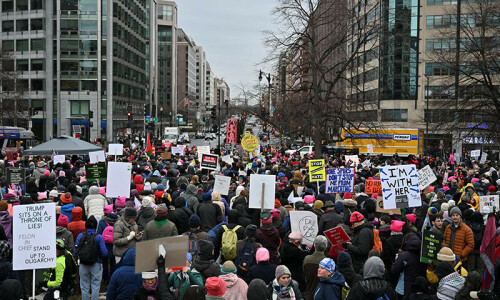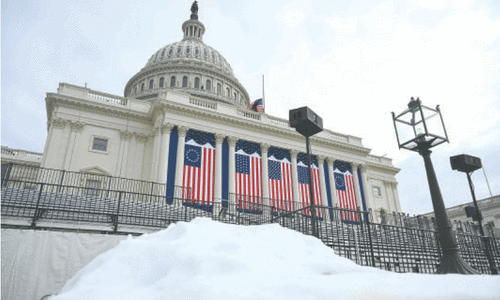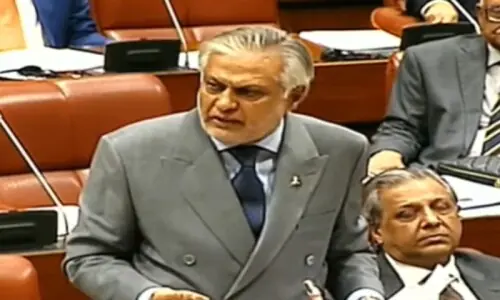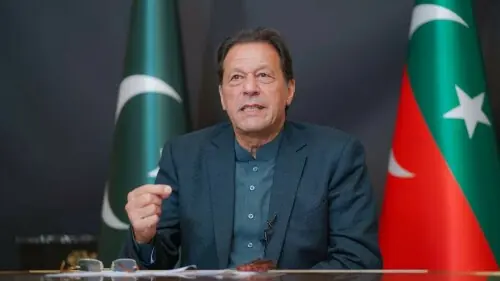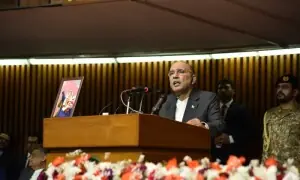WASHINGTON: President Donald Trump’s second inauguration, scheduled for Jan 20, has been affected by freezing weather, setting the tone for a term likely to face logistical, political and geopolitical challenges.
The ceremony, initially planned for the iconic West Front of the US Capitol, has been moved indoors to the Rotunda, marking the first such relocation since Ronald Reagan’s second inauguration in 1985.
This shift, while prioritising public safety, displeases thousands of attendees who had planned to witness the event in person. The National Mall and Capital One Arena, however, have arranged live broadcasts and gatherings to offset restricted access.
President Trump, addressing the relocation, has emphasised the safety of attendees, law enforcement and first responders amid freezing conditions. Critics, however, have raised concerns over inclusivity and accessibility, noting the abrupt change could prevent many from attending this historic event.
President-elect’s unconventional approach sparks uncertainty but can also deliver unexpected successes
The weather also dampened the spirits of Trump’s opponents. Their “People’s March” on Saturday drew significantly smaller crowds than the 2017 Women’s March, which also reflects the changing dynamics of opposition. Abortion rights, the Israel-Hamas conflict and immigration dominated the protests, highlighting the administration’s contentious domestic and international policies.
The relocation of the inauguration is testing the adaptability of security agencies as well, with recalibrated measures ensuring a secure indoor ceremony and managing both welcoming crowds and protests across Washington. These early logistical challenges symbolise the broader obstacles Trump faces as he embarks on a term defined by ambition and unpredictability.
Ambitious agenda
President Trump’s second term is poised to introduce sweeping changes across immigration, taxation, education, and foreign policy. In the Middle East, the administration aims to expand the Abraham Accords, focusing on persuading Saudi Arabia — and potentially Pakistan — to recognise Israel.
Analysts note the administration’s strategy of leveraging adversarial weaknesses, such as the collapse of Bashar al-Assad’s regime in Syria and Hezbollah in Lebanon, to advance US and Israeli interests while intensifying pressure on Iran.
At home, “Trump’s basic appeal is a vow to take power away from the elites and invaders and return the country to its rightful owners — the real Americans,” observes George Packer of The Atlantic. This vision drives both his domestic and foreign policy initiatives, seeking to redefine America’s role on the global stage.
The Council on Foreign Relations (CFR) highlights the administration’s significant challenges, noting that Trump’s second term begins “at a moment of great peril for the United States”.
The CFR’s Preventive Priorities Survey identifies five high-likelihood, high-impact events: the continuation of the Israel-Hamas conflict, a separate West Bank escalation, significant Russian gains in Ukraine, Iran-Israel hostilities, and a crisis at the US southern border. Moreover, moderate-likelihood crises over Taiwan and the South China Sea pose additional risks.
“The possibility that the United States could find itself in wars with not one but two major, nuclear-armed powers” could not be ruled out, warns Paul Stares, who directed the CFR survey, which underscores the importance of careful diplomacy and contingency planning.
South Asia: a balancing act
In South Asia, Trump will be as interested in Afghanistan and Pakistan as his predecessor, Joe Biden — focusing mainly on terrorist threats. The resurgence of ISIS-K in Afghanistan has raised alarm, with experts warning of potential attacks on American interests or the West. Strengthening counterterrorism cooperation with Pakistan is a priority, but relations remain strained over disagreements about the Afghan Taliban’s role.
“Pakistan remains a crucial player in maintaining regional stability,” said John Kirby, emphasising Islamabad’s importance in countering cross-border terrorism. However, Washington’s scepticism of the Taliban government, particularly its ties to al-Qaeda, adds complexity to this relationship.
Pakistan also faces its own security challenges, with escalating violence in tribal areas and Balochistan. Islamabad has called for greater international support to address these issues, emphasising the need for economic stability and regional cooperation. While the US has pledged assistance, experts warn against alienating Pakistan, as it risks pushing the country closer to China.
Trump’s foreign policy approach remains bold and unconventional. A Chatham House report notes, “The boldness with which Trump is remaking the rules of US diplomacy has been dizzying.”
However, the report also warns that these gambits are creating uncertainty among allies who fear abandonment. Countries like Taiwan and Ukraine face heightened anxieties as the administration seeks to realign US commitments.
Despite these challenges, Trump’s earlier success in brokering the Abraham Accords and enabling an Israeli-Palestinian peace deal last week demonstrates his ability to defy expectations. His administration’s ambitions to reshape US foreign policy hinge on a combination of assertiveness and adaptability and Trump is capable of doing both.
Challenges and opportunities
Trump’s second term will also draw strength from a Republican-dominated Congress. Although his assertive foreign policy risks straining relations with allies, congressional support would allow him to do what the outgoing Biden administration could not. This opens up new opportunities for transformative leadership.
Domestically, as George Packer notes, Trump’s appeal lies in his ability to promise a return to traditional American values, curb immigration and deport unwanted foreigners. Whether his administration can deliver on these promises amid a volatile global landscape will define his legacy. Success will depend on turning obstacles into opportunities, ensuring that this term is remembered for substance rather than controversy.
Published in Dawn, January 19th, 2025



